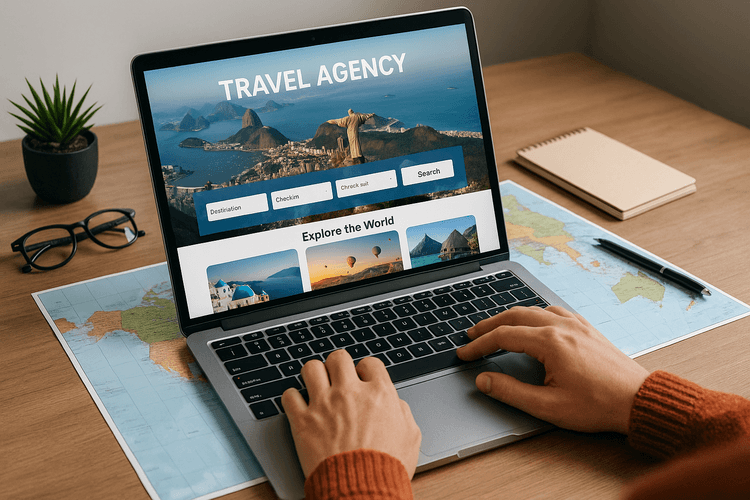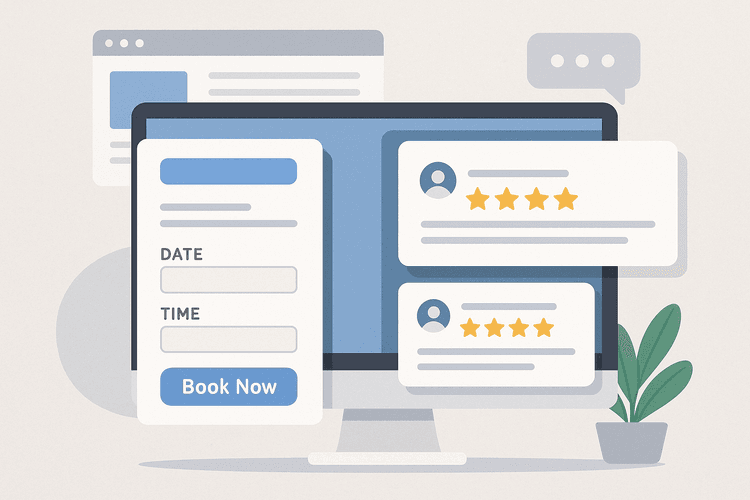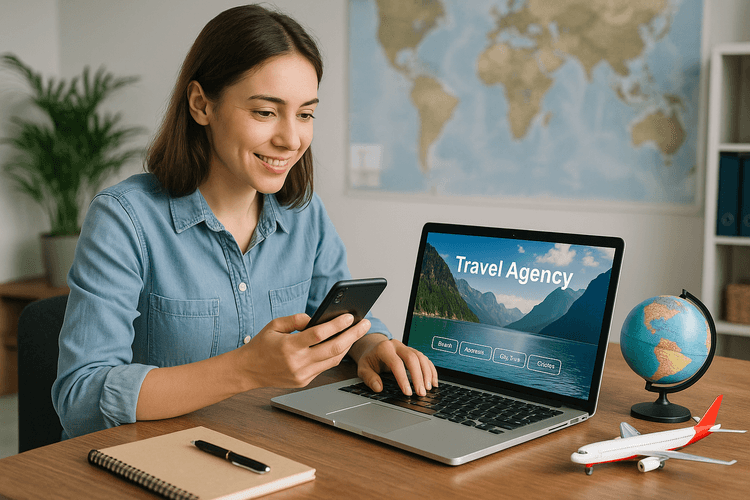
Website goals

Before starting to create the website for your travel agency, it is important to establish the objectives you want to achieve with your site. These objectives should align with your company's marketing strategy and should include:
- Promoting the agency's services: Your website should be designed to promote your travel services and inform customers about special offers. This means presenting the available tour packages in a clear and prominent way.
- Increase site traffic: The increase of traffic on the site is an essential goal for any online activity. This can be achieved through a combination of SEO techniques, social media advertising, and other forms of digital marketing.
- Improving user experience: The visitors of your website should have an positive experience in order to keep their attention high and encourage them to make a purchase. This means that your website should be easy to navigate, quick to load, and contain all the necessary information.
- Capture qualified leads: Your website must capture qualified leads to feed your sales funnel. This can be achieved through the creation of contact forms, publishing useful content such as blogs and travel guides, and offering incentives for newsletter sign-up.
- Improve conversion: Finally, your website should be designed to convert visitors into customers. This means you will need to include clearly visible calls-to-action on your tour packages and other special offers.
Example:
Let's assume that your main goal is to promote your tour packages. In this case, it is essential that the homepage of your website clearly presents all available destinations and their special offers. Additionally, you could create a dedicated page for each tour package, with all the required information and a prominently visible "book now" button.
Defining the target audience

Before starting to create the website for your travel agency, it is essential to define the target audience. Who are your potential customers? What are their needs and preferences?
Market analysis
To identify your target audience, you will need to analyze the travel agency market. Look for information on current trends, competitors, and most importantly, consumer needs.
This way, you will be able to establish which part of the market you want to reach and how to do it. For example, if you notice that many young people are opting for low-cost trips abroad, you might decide to target this type of audience.
Characteristics of your target audience
After analyzing the market, you will need to determine the characteristics of your target audience. For example:
- Age: what is the average age of your potential clients?
- Gender: do you have a predominantly male or female audience?
- Budget: what are the financial means of your customers?
- Interests: what does your target audience feel most passionate about? Are they interested in culture, food, sports?
- Family Situation: are you dealing with couples, families with children, or singles?
These are just a few examples of characteristics that might be relevant for your travel agency. Obviously, the features of your target audience will depend on the type of service you offer and your marketing strategies.
Create your buyer persona
Once you have identified the characteristics of your target audience, you can create your buyer persona. This is a fictitious image of the ideal customer for your travel agency.
The buyer persona should include all the information gathered during market analysis, as well as more specific details like place of residence, occupation, and preferred channels for receiving information about your agency.
Having a clear image of your target audience will help you create an effective and personalized website capable of meeting your customers' needs and generating conversions.
Choosing the platform for website creation

The choice of platform for creating a website is a crucial step for the travel agency that wants to have an effective online presence. There are several options to choose from, each with its own advantages and disadvantages.
Framework360
An option worth considering is definitely Framework360, the first complete digital marketing platform that helps you create and manage your website with total autonomy in choice and perform digital marketing. Thanks to the AI-based theme generator and the block visual builder, you can easily customize your site in an intuitive and fast manner.
Website structure and organization

Once you have set up your environment on Framework360 and chosen the most suitable graphic theme for your business, it's time to structure and organize your website. A good organization allows visitors to easily navigate within the site and find what they are looking for.
Main page
The main page (home page) represents the first impression that visitors will have of your site. It must be engaging and contain the most important information about your travel agency. Typically, the home page should include:
- An image or slideshow that represents the activity of the agency.
- A brief description of the services offered by the travel agency.
- Information on the most popular vacation packages.
- A search form to book flights, hotels, or vacation packages.
Informative pages
The informative pages are those that provide details about the travel agency's offerings. For example:
- Holiday Packages: detailed descriptions of proposed tourist destinations, photos, and prices of available holiday packages.
- Services: information about other services offered by the agency, such as travel insurance, transfers, tickets for shows.
- Contact Information: details on how to contact the agency (address, telephone number, email) and a map to reach the agency's location.
Booking pages
The booking pages allow website visitors to make a reservation. Typically, booking pages include a form where visitors can enter their travel dates, desired type of accommodation, and the number of people traveling. Once the form is filled out, visitors can proceed with booking and online payment.
Navigation
The website navigation should be intuitive and easy to use. Most websites feature a main navigation bar at the top or on the left side of the main page. All sections of the website should be listed here. In addition, it is possible to also use sub-sections within informative pages to make user navigation even simpler.
By following these tips, you should be able to create a well-organized and easy-to-navigate website for your travel agency. Always remember that the structure and organization of your site are fundamental in attracting new customers. Good luck!
Website design and branding

The design of the travel agency's website is one of the most important aspects to consider when creating the site. The design should be appealing, easy to navigate, and representative of the brand of the agency.
To begin, choose a theme that suits the needs of the travel agency. Framework360 offers a wide selection of ready-to-use themes, but you can also customize your own theme to better reflect the brand image of the agency.
Use the colors, images, and logo of your travel agency to create a cohesive and recognizable design. For example, if the agency has a logo with predominance of blue and green, use these colors in the website design.
Furthermore, ensure that the design is responsive and mobile-friendly, so that the site can be properly viewed on any device.
Finally, maintain consistency in the design of the website pages. Use the same fonts, colors, and layouts across all pages to create continuity and facilitate navigation for the user.
- Reflect the brand image of the travel agency in the design of the website.
- Use a theme consistent with the needs of the company.
- Create a responsive and mobile-friendly design.
- Maintain consistency in the design of the website pages.
Creating quality content for the website

Creating quality content is one of the most important aspects in developing a website for a travel agency. The content must be informative, engaging, and persuasive to attract potential customers.
Identifying your target audience
Before you start writing content for the website, it's important to identify your target audience. In this case, the travel agency will need to address people who love to travel and are looking for information on interesting destinations. They may also be looking for affordable vacation packages or unique experiences.
Once the target audience has been identified, you can think about the contents to include on the website.
Destination information pages
A fundamental section of the website will be dedicated to destinations. Each page should provide detailed information about the location, such as climate, culture, and main tourist attractions. It will also be important to include images and videos to best showcase the beauty of the places.
Holiday packages and special offers
The travel agency can create a section dedicated to holiday packages and special offers. This section will list all available packages with their descriptions and prices. Highlighting special offers will be important to attract the attention of potential customers.
Travel blog
Another way to create interesting content for the website is by adding a travel blog. Here, informative and engaging articles about destinations, travel tips, and user experiences can be published. Blog posts can be shared on social media to increase the visibility of the website.
Customer reviews
Finally, it will be important to include a section dedicated to customer reviews. Positive reviews will be fundamental in convincing potential clients to choose the travel agency. In this section, you can also add photos and videos of customers' holidays.
- Quality Content
- Target Audience
- Destinations
- Vacation Packages
- Special Offers
- Travel Blog
- Customer Reviews
Seo optimization for the website

Optimizing your website is essential for achieving high visibility on search engines like Google. This means that your site must be optimized for search terms relevant to your business, so as to appear among the top search results.
Keyword research
First of all, you need to conduct thorough research of keywords related to your services and products. This activity will allow you to identify the most searched words by users and then use them in your site's content.
For example, if your agency offers holiday packages in Italy, you might include keywords such as "holidays in Italy", "travel packages Italy", etc.
Title tags and meta descriptions
Title tags and meta descriptions are important elements of on-page website optimization. The title tag is the heading that appears in search results, while the meta description is a brief description of the page's content.
Here are some tips on how to optimize these elements:
- Include the main keyword in the title tag
- Keep the title tag under 60 characters to ensure it's fully displayed in search results
- Include the keyword also in the meta description
- Keep the meta description under 160 characters to ensure it's fully displayed in search results
- Write an engaging meta description that prompts action (for example, "Discover our holiday packages in Italy and book your next adventure now!")
Quality content
The website's content must be of high quality and relevant to your services. Include the main keywords in the text, but avoid stuffing it with too many search terms.
A good way to create quality content is to answer frequently asked questions from customers or provide useful tips on how to organize a trip. By doing this, you not only offer valuable information to your site's visitors but also demonstrate your expertise in the field.
Backlinks
Backlinks are links from other websites that point to yours. This type of link can increase the credibility of your site in the eyes of search engines and therefore improve its positioning in search results.
You can obtain backlinks through various strategies, for example by participating in industry events or writing guest posts for other websites.
Remember that SEO optimization takes time and consistency, but the results can be very beneficial for your travel agency.
Incorporate useful features into the website, such as online bookings or customer reviews

The website of a travel agency must provide visitors with practical tools for booking and choosing their destination.
Online bookings
By including a section dedicated to online bookings on the site, customers will be able to check availability and prices in real time, make reservations, and payments quickly and securely.
In fact, Framework360 offers a special module for travel agencies that allows managing bookings easily and swiftly. Thanks to this module it is possible to accept online payments via credit cards or PayPal, send automatic booking confirmations by email, create special promotions and last-minute offers, all controlled from your personal dashboard.
Customer reviews
Customer reviews are extremely important in building a positive reputation for the travel agency. In this way, other potential customers can evaluate the reliability of the service provided by the agency.
Incorporating a section dedicated to customer reviews on the website can increase the transparency of the service offered by the agency. In this section, visitors can read other users' opinions and share their own experience.
To incorporate this feature into the website, Framework360 offers a range of dedicated tools, including a module for managing reviews. With this module, it is possible to moderate user reviews, respond to comments, and use positive reviews as testimonials to display on the site.
- To insert a customer review section:
- Log in to your Framework360 dashboard
- Go to the page and open the Visual Builder
- Select the "Reviews" block and customize it according to your needs
By incorporating these useful features into the site, the travel agency will be able to offer its customers a complete and professional service.
Testing the website before launch

Before launching your website for the travel agency, it is important to conduct a series of tests to ensure that everything works properly and that visitors can navigate through the site with ease.
Check the loading speed of the site
The loading speed of the site is a crucial factor for user experience and search engine rankings. Use a free online tool like Google PageSpeed Insights to check the loading speed of your site. If you encounter any issues, consider reducing image sizes or using a CDN (Content Delivery Network).
Check browser compatibility
Your visitors may use different browsers to view your website, so it is important to ensure compatibility with common browsers such as Chrome, Firefox, Safari, Edge, and Internet Explorer. Use an online tool like BrowserStack to check how your site works on different platforms and browsers.
Check the mobile version of your site
Today, more and more people browse the internet from their smartphone or tablet, so it's crucial to make sure that your site is perfectly optimized for mobile devices as well. Use the Google Mobile-Friendly Test tool to check if your site is responsive and adapts correctly to different screen sizes.
Check links and forms
Before launching, verify that all site links are working properly and do not return 404 errors. Also, ensure that all forms are functional and that notification emails are received correctly.
Ask for feedback
Finally, ask friends, family or colleagues to test your website and provide you with honest feedback about the design, navigation, and user experience. Take the time to make any necessary changes before the official launch of your website.
Promote the travel agency website

Now that you have created a website for your travel agency, it is important to ensure that your audience can easily find it. Here are some tips to promote your site:
1. Use seo techniques
Make sure to use relevant keywords in the content of your website and in the meta description. This way, search engines like Google will rank your site better and show it to potential customers when they search for similar services.
2. Create a blog
Create a blog on your website and write interesting articles about tourist places, activities to do, and travel experiences. This will attract the audience's attention and increase the visibility of your website on search engines.
3. Advertise online
Publish online ads through Google Ads or Facebook Ads, targeted at people looking for information on tourist destinations. This will help you increase the visibility of your website and attract new customers.
4. Promote your website through social media
Create social media accounts for your travel agency on major social networks (such as Facebook, Instagram, and Twitter) and regularly share photos and posts about your travel products. Additionally, use social media to promote special offers and discounts on travel packages.
5. Collaborate with other websites
Look for websites that deal with tourism and travel and propose a collaboration to exchange links or mutually publish articles. This will help increase traffic to your website and improve the online visibility of your travel agency.
- Utilize SEO Techniques
- Create a Blog
- Advertise Online
- Promote Your Site Through Social Media
- Collaborate with Other Websites
In summary, to be successful in the tourism industry it is important that your travel agency is visible online. There are various strategies available to promote your site and attract new customers. By using these techniques, you can increase your agency's presence in the digital world, gain more visibility, and compete effectively in the online tourism market.
You can do it too, you just need a lot of commitment and an excellent marketing and sales platform.







